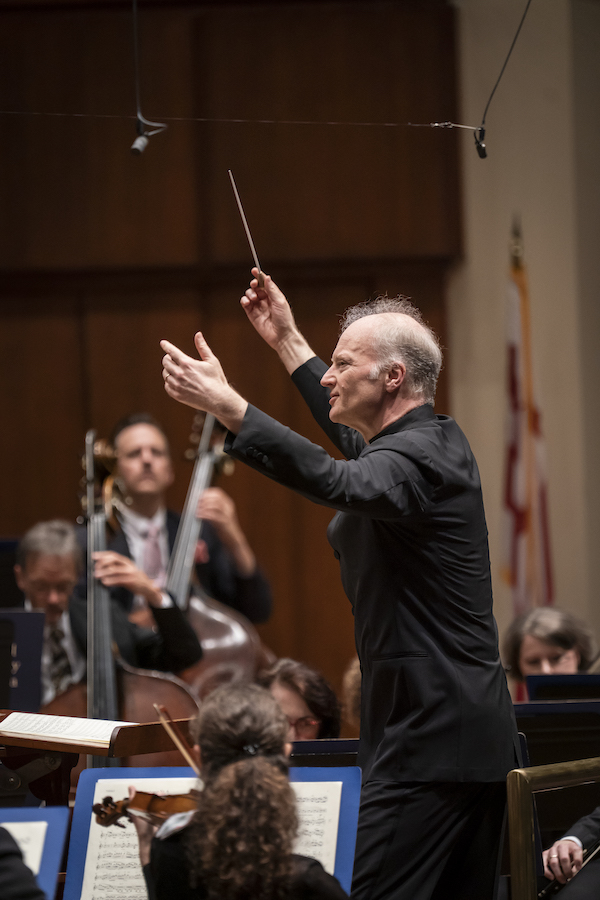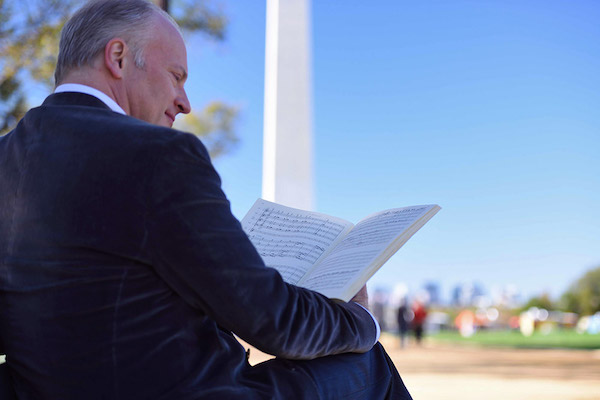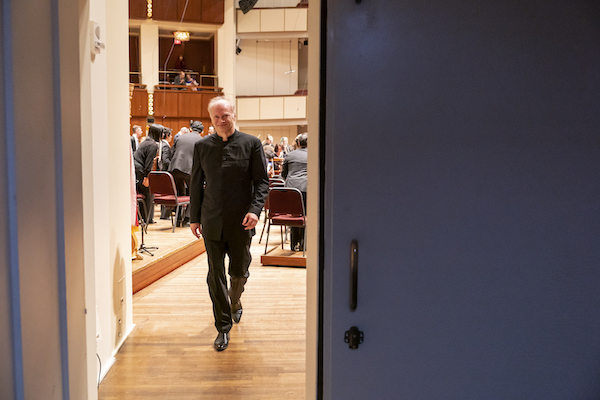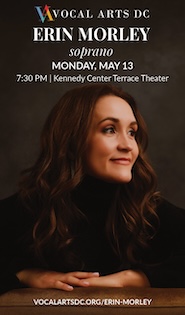At start of seventh season, Noseda is happy and ready for new challenges with NSO

Gianandrea Noseda opened the National Symphony Orchestra’s 2023-24 season Saturday night at the Kennedy Center. Photo: Scott Suchman
Gianandrea Noseda has begun his seventh season as music director of the National Symphony Orchestra. In the years since our first interview with him, the Italian conductor has hired twenty-two musicians, with more auditions for violin positions coming at the end of this month.
“I think that the orchestra is playing very well, and the recognition by the audience and also by the critics is very positive and encouraging,” he said speaking from Zurich last week. “The fact that we are invited regularly to Carnegie Hall, which I consider a sort of American stage, is also a signal of the recognition of the work we have been doing.”
Last year the NSO announced that it would extend Noseda’s contract through the 2026-2027 season. That would be his tenth season as music director, a longer tenure than his last two predecessors, Iván Fischer and Christoph Eschenbach. Does he envision staying in Washington longer than that—perhaps long enough to outlast Leonard Slatkin (12 seasons) or even Mstislav Rostropovich (17 seasons)?
Noseda quoted an Italian saying, “Mai porre limiti alla provvidenza” (never place limits on providence), lest one cut good fortune short. “Ten years is a good chunk of time,” he said adding that he is happy here. “I like it every time I come back to Washington,” he said, “and I’m really looking forward to the opening of my seventh season.”
Over the course of the coming season, Noseda will celebrate his 60th birthday, a major milestone. Themes in his programming this year feature the three countries that have formed him musically, beginning, of course, with Italy. He will celebrate his Italian roots with an all-Respighi program next month, which offers the rare chance to hear the composer’s complete Roman Trilogy: Fountains of Rome, Pines of Rome, and Roman Festivals.
Respighi went out of his way to create unusual sound worlds in all three pieces. “Respighi’s imagination with orchestral colors is absolutely supreme, and by the way he learned that from Rimsky-Korsakov,” Noseda added. “He spent time in St. Petersburg, playing the viola in the Mariinsky Orchestra, and during that time he took lessons with Rimsky-Korsakov.” That connection to St. Petersburg is something Noseda has in common with Respighi.
Ultimately, Noseda will take the NSO back home with him, on his first international tour with them, to Spain, Germany, and Italy, including a stop at the Teatro Alla Scala in his native Milan. “This is part of the Filarmonica della Scala season,” Noseda said proudly, as a regular guest conductor with that ensemble. “Every season the Filarmonica invites one orchestra. Last year, it was Semyon Bychkov with the Czech Philharmonic, and this year it will be us. This is a sign of respect, to have the NSO on that golden stage,” as the Italians call it. Noseda strongly hinted that the NSO is already exploring other international touring possibilities as well.
The Italian part of the season concludes with Verdi’s Otello next summer, the beginning of a commitment the conductor has made to performing an opera in concert each season. Opera has become an even more important part of Noseda’s life since he was appointed music director at the Zurich Opera in 2021. “A part of me is operatic,” he said. “I feel very at home in both fields.”
He was unwilling to speak on the record about future opera programs that are not yet announced, but he dropped some enticing hints, saying there are both American and Italian candidates in the running. “I like the fact that the orchestra will have more regular contact with singers,” he explained. “I think that helps their sound, the phrasing of the sound.”

Photo: Scott Suchman
As for the American part of his birthday season, Noseda sees that part of his life mostly in the new pieces the NSO will perform this season. Coming off a recording project combining all of George Walker’s symphonies, Noseda will conduct the world premiere of Carlos Simon’s Concerto for Orchestra and take the piece on tour in Europe. He wants to do more Copland and Bernstein, he said, “because I love both of those composers.” Other new pieces by Adolphus Hailstork, Billy Childs, Bryce Dessner, and Anna Clyne will also receive their world premieres.
Finally, what about the Russian part of the celebration this season? “I spent three months a year for a decade as principal guest conductor at the Mariinsky Theater in St. Petersburg,” Noseda explained. “That is the ground where I really got deeply inside the Russian culture of making music. That’s why we are celebrating the 150th anniversary of Rachmaninoff.” This program, opening Thursday night, combines the Piano Concerto No. 4, with Denis Kozhukhin as soloist, plus the youthful tone poem The Rock and the choral symphony The Bells.
For the vocal soloists, Noseda has cast three soloists from the Russian orbit, all making their NSO debuts. Russian soprano Elena Stikhina performed just last spring in Russia with Valery Gergiev; the tenor Pavel Petrov is from Belarus, and Russian bass-baritone Alexey Markov is a regular at the Mariinsky Theater, where Gergiev is still artistic director.
Is Noseda concerned that some American listeners may object to artists who refuse to condemn Russia’s brutal invasion of Ukraine and continue to keep their careers in Russia? “It’s always a complicated matter,” he responded. “To put music and Russian culture above the political decision of Putin to invade Ukraine is difficult, but we still have to insist that Rachmaninoff, Tchaikovsky, Tolstoy, Dostoevsky, Pushkin—they don’t have anything to do with this situation.”
But can democratic countries, as he put it, really “fly a little bit above today’s situation,” which he acknowledges is very tragic? Noseda is also music director of the Tsinandali Festival in Georgia, where he had the chance to do just that. “I just conducted Tchaikovsky’s Fourth two weeks ago, with an orchestra made up of young people from Georgia, Armenia, Azerbaijan, Turkey, Ukraine, and Russia,” he said. “And they were playing next to each other. With the younger generation, it is easier to get into contact, to have a personal relationship.”
The situation is trickiest for Russian musicians, he says. “It is difficult for a Russian who lives in Russia to speak about the war, because you have your family there,” he reasoned. “The decision by their president is dictatorial, so how can you speak against it?” The risks are too great even to express your thoughts.
He turned to an example from his own family. “My grandfather was very anti-fascist during the 20 years of fascist rule in Italy,” Noseda explained. “But he couldn’t say anything or he could have been killed. So he never said he was pro-Mussolini, but he couldn’t say he was against him either. The only thing I can say is that if [these singers] come, they are here only to serve Rachmaninoff and Russian culture, more than Russian politics.”

Photo: Scott Suchman
The final focus of Noseda’s birthday season is to highlight close friendships with some cherished performers: Fazil Say, Seong-Jin Cho, Hilary Hahn, among others. “These are artists I particularly love to work with because they approach music in a way combining profundity of conception and improvisation,” he said. “I like these two things to live together: depth and a sense of surprise in performance.”
He took a moment to recall how this January’s unusual program with Fazil Say had come about. “I invited Fazil to play a recital in 2019 at the Stresa Festival,” where he is music director, he said. “At dinner after that performance, I gave him my piano score of the Wilhelm Friedemann Bach Concerto in E Minor. After that I got a message from him: ‘Why don’t we do it’? And that is how this program started.”
Noseda then upped the ante and suggested that, since he wanted to combine that piece with some neoclassical Stravinsky, they also perform Stravinsky’s Capriccio for Piano and Orchestra. “He told me, ‘I’ve never done it, but for you, I’ll do it’,” he concluded with a laugh. “Nobody in the world could have expected to hear Fazil playing those two pieces!” This has been one of the strengths of Noseda’s tenure, his unexpected choices of repertoire.
At the start of his opening season, Noseda underwent surgery for a herniated disc in his back, which caused him considerable pain. He has fully recovered from that issue, but how is he feeling these days, as his 60th birthday is approaching? “If I think, ‘I am 60’, I would not recognize myself,” he said, laughing off the question. “I still feel I have a lot of energy, even though the years are there.”
“But now I feel the need to do something better in terms of knowledge,” he explained. “Perfection is not something we can possibly achieve. More understanding of what I am doing, even in pieces I have conducted a lot. Not to do a photocopy of what I have done previously with a work.” He searched his thoughts for a moment. “To find myself more in the music, to disappear more as Gianandrea Noseda and to serve the music.”
Those who have watched him over the years know that he will not lose his urgency or intensity at the podium, but it sounded like he is becoming more circumspect. “When I was a young conductor, I thought that I could change the world through music,” he said. “Now I think that music cannot change the world, but music still has huge power to change the hearts and minds of people. That is what I want for this phase of my life.”
Denis Kozhukhin joins Gianandrea Noseda and the NSO for a program dedicated to the music of Rachmaninoff September 28 to 30. kennedy-center.org




Posted Sep 27, 2023 at 9:24 am by Joann Mason
Those of us who live in Washington (and beyond) are enriched by the presence of this great talent. What a privilege to be in the concert hall when he is conducting. Thank you Maestro Noseda (and remember behind every great man there is a great woman so thank you to his beautiful and talented wife Lucia!!!)
Wonderful interview!